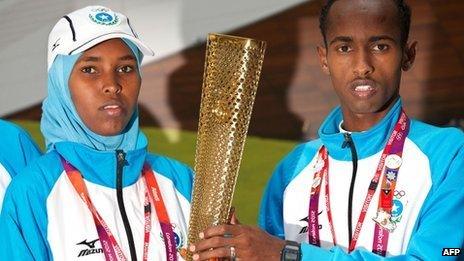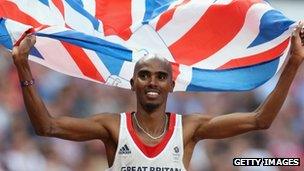Somali Olympians deny seeking asylum over threats
- Published

The Islamist al-Shabab group oppose activities they deem to be "Western", including certain sports
One of two Somali athletes competing at the Olympic Games in London has denied that they are seeking asylum in the UK.
Mohamed Hassan Mohamed, a 1,500m runner, told the BBC Somali Service they both intended to return home.
Earlier his compatriot Zamzam Mohamed Farah, who ran in the first heat of the women's 400m, spoke of the threats she has faced since competing.
Somalia has been devastated by two decades of conflict and an al-Qaeda group controls many areas.
Its last functioning national government was ousted in 1991 and the resulting vacuum has enabled both pirates and lawlessness to flourish.
'Worried'
Mr Mohammed, 20, told the BBC that he and Ms Farah were going back to the capital, Mogadishu, this coming Tuesday.
He admitted that they were worried about the threats they had received but they did not intend to stay in the UK and apply for asylum as some reports had suggested.
The Islamist al-Shabab, which joined al-Qaeda in February and controls much of rural southern and central Somalia, oppose activities they deem to be "Western", including certain sports.
Ms Farah told London-based Universal TV that she had been singled out for carrying the national flag at the opening ceremony and "exposing herself" during her race.
An observant Muslim, the 21-year-old took to the track in a headscarf and with her arms and legs covered. She also ran while fasting, in accordance with the holy month of Ramadan, the television reported.
"There are a lot of threats coming through both Facebook and on the telephone. My parents have also been called and were informed that what I did was not a good thing and that once I return, I will be dealt with."
She added that Mohamed had been told that "there is a cross on his head and that if he returns to Mogadishu, his head will be no more".

Mo Farah left Somalia as a child and now competes for Team GB
In April, the president of Somalia's Olympic Committee, Aden Yabarow Wiish, and the Somali Football Federation chief, Said Mohamed Nur, were killed in a suicide attack in Mogadishu.
In 2010, al-Shabab said it carried out twin bombings in Uganda which killed more than 70 people who had gathered to watch the World Cup final on TV.
But for several months, the group has come under pressure on several military fronts and the capital is now mainly under the control of African Union peacekeepers.
Correspondents say despite continued insecurity and assassinations in the city this has led to a construction boom and hopes that the UN-backed process under way to elect a new government and president this month will bring more stability to the country.
Speaking before the Games, Ms Farah, who shares the name of the two-time Olympic gold winner Mo Farah - a Somali-born British athlete, said medals were not a priority for her: "I am not going there to win, but for pride... I will be representing my flag, my soil and its people."